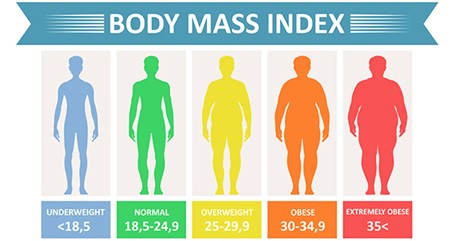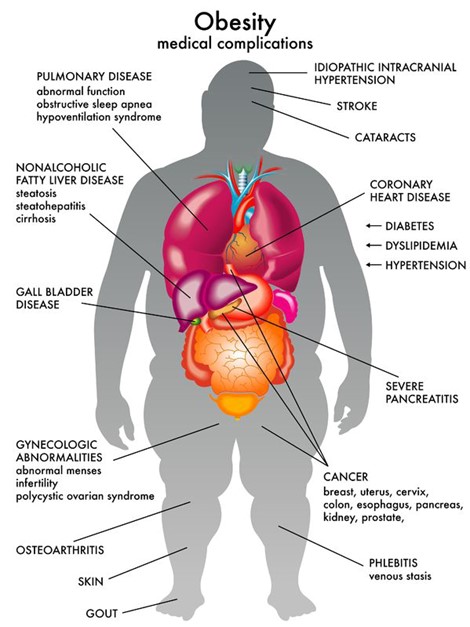Apart from smoking, the number one cause of death, which is preventable, is obesity. It results in the death of three hundred thousand people every year. Yes, you read it right. You might be wrong if you are of the perception that obesity is just a cosmetic concern. Obesity is a multifactorial complex “disease”, which involves an excessive amount of body fat, which with time increases the risk of other health problems such as cardiovascular diseases, high blood pressure, diabetes and even certain types of cancers. Body Mass Index (BMI) works as a basic screening tool to assess the obesity of an individual. It is calculated using the formula: weight (kg) / [height (m)]2.

Obesity and overweight issues, which were once considered as problems in solely high-income countries, are on the rise now also in the middle- and low-income countries, especially in urban settings. Since 2000, the number of obese children in Africa has increased by about 24%. With the motto of promoting and offering practical solutions to put an end to the global obesity crisis, “World Obesity Day” is observed throughout the world on 4th March every year. Its aim is to “lead and drive global efforts to reduce, prevent and treat obesity”.
Lifestyle Choices Responsible:
Obesity is not an overnight phenomenon; it slowly develops from poor lifestyle choices and an unhealthy diet.
• One of the prime reasons responsible for obesity is the lack of regular physical activity and exercise. Sedentary activities, such as screen time, have also been linked to obesity.
• Frequent consumption of processed food and a high calorie diet which lacks veggies and fruits significantly deteriorates one’s health leading to corpulence.
• Consumption of alcohol and aerated sugared drinks add significantly to one’s weight gain.
Are You Feeding Your Body or Your Mind?
We all know well what is good for our bodies, still we turn blind when it comes to healthy eating. It is not just willpower that is responsible for making us overeat, but sometimes it is the sneaky tendency we develop without even realizing it, such as skipping our meals or munching on our favorite snacks. This habit, which is developed by most of the people nowadays, results in a lot of weight gain. Obesity does not develop because of the “food we need to eat”, it develops because of the “food we want to eat”. Therefore, we should start training our mind to eat healthy from a young age and realize that junk food is only welcomed by our tongue, whereas a healthy diet is welcomed by our whole body.
Does Stress Have a Role to Play?
Stress has a significant job in the development and prolongation of obesity in people having elevated sensitivity and exposure to glucocorticoid. Stress has for quite some time been suspected to be interrelated to weight gain. It is suggested that the extent of glucocorticoid action somewhat expounds the interindividual differences that exist between the relation of the two. Certain mental disorders and abdominal obesity are related strongly to the elevated long-term levels of cortisol concentrations in the hair, as measured in individuals. However, increased levels of cortisol are not present in every patient who is obese. Perhaps, the variation in the interindividual affectability of glucocorticoid, which is also decided by heredity to some extent, might render physical and mental stressors highly vulnerable.
A considerable number of serious health issues are likely to develop in people with obesity, which includes:

Treatment is the Last Resort!
• The most basic treatment for obesity is bringing a change in lifestyle. Though difficult in the beginning, with patience, efforts, and consistency, one can definitely improve one’s health and may be able to lose weight.
• When physical activity habits and healthy eating are not enough, doctors may prescribe drugs to treat obesity. Some of these medicines may even pose serious side-effects.
• Gastric balloon system, electrical simulation system and gastric emptying system are some of the weight-loss devices which a doctor may consider if surgery is not preferred.
• When all other treatments fail, the doctor may resort to bariatric surgery, which includes different kinds of operations that help in losing weight by making certain changes in the digestive system. The medical condition of extremely obese people, especially people suffering from type 2 diabetes may also improve following bariatric surgery.
Probiotics to Rescue?
The role played by gut microbiota, as of late, has been potentially given attention in relation to obesity development. Numerous recent studies have shown that the composition of the gut microbiome of an obese person can remarkably differ from that of leaner individuals. In light of this evidence, probiotics have been contemplated as one of the possible formulas for both prevention and treatment of obesity. Several research have discovered that the probiotic impact on metabolism and body weight is to an extent, strain specific. Some species of the Bifidobacterium and Lactobacillus genera are found to be effective, whereas the use of other strains may be deleterious. Nonetheless, despite a lot of information, the utilization of probiotics to forestall and treat obesity and related diseases remains a topic of debate. Further experimentation is required before probiotics can be soundly recommended for the avoidance or treatment of obesity.

